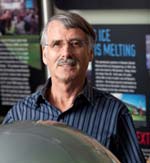Part 1. Anthropogenic Climate Change

Dr. Kevin E. Trenberth
I found a respected and highly cited authority on climate change who was willing to answer a few questions on the manmade vs. natural climate debate.
Kevin E. Trenberth heads the Climate Analysis Section at the National Center for Atmospheric Research, based in Boulder, Colo. From New Zealand, he obtained his doctorate of science in meteorology in 1972 from Massachusetts Institute of Technology. He was a lead author of the 1995, 2001, and 2007 Scientific Assessment of Climate Change reports from the Intergovernmental Panel on Climate Change (IPCC), and shared the 2007 Nobel Peace Prize that went to the IPCC.
Here are Dr. Trenberth's responses:
Do you believe that global climate change is predominantly manmade?
There is a lot of climate change or climate variability on many time scales. Human influences have only become strongly evident since about 1970 when the increases in carbon dioxide and other greenhouse gases have become large enough to push values outside of natural variability, but even then only with about 20-year time horizons.
What is the scientific evidence for your position?
1) The main cause is changes in atmospheric composition: We have measurements, and we know it comes from human activities.
2) We know some of these changes affect heating: the greenhouse gases, and cooling: pollution.
3) We know the planet is warming: many signs from all sorts of measurements.
4) We can assess all other possible sources and none come close, but the assessment of changes in the atmospheric composition actually agrees with what is being observed.
Climate models are used to help predict future conditions. What makes a reliable model and do you think it is reasonable to base policy, such as EPA's greenhouse gas endangerment finding, on these models?
A model can be useful as a tool but no policy should be based on models alone. Models have to be extensively tested and their strengths and weaknesses understood and allowed for.
Do you think the U.S. government's interest in the study of global climate change has any kind of hidden agenda? For example, it has been suggested that such a driver could help revitalize the economy...?
No, the federal government is concerned for the world we live in on the long term. No doubt there are economic opportunities and we should grasp them. But the main reason is to become a lot more efficient and reduce our footprint on the planet. Or else.
—K.T.
As always, I am looking forward to your comments and could use some suggestions in finding a skeptic (Part 2) who has participated in the IPCC reporting process and might be willing to answer the same questions.
Posted by L.K. Williams, EPonline on Feb 24, 2010